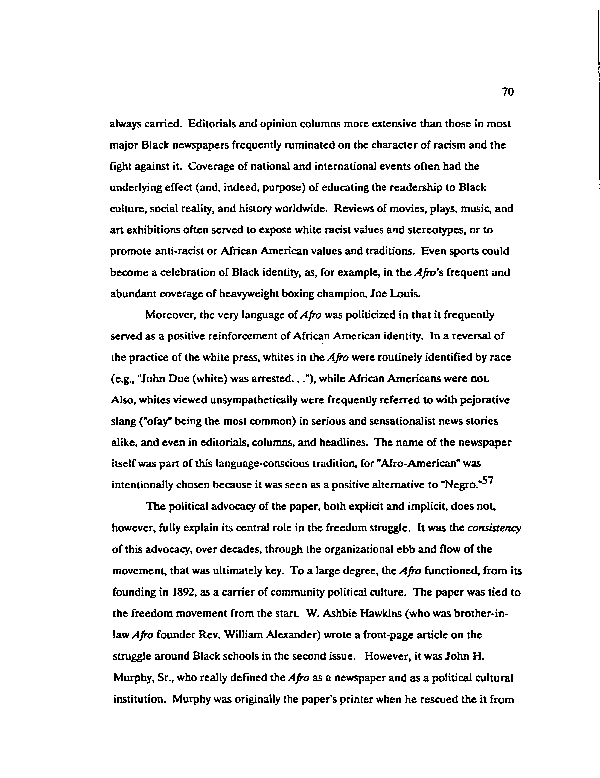|
70
always carried. Editorials and opinion columns more extensive than those in most
major Black newspapers frequently ruminated on the character of racism and the
fight against it. Coverage of national and international events often had the
underlying effect (and, indeed, purpose) of educating the readership to Black
culture, social reality, and history worldwide. Reviews of movies, plays, music, and
art exhibitions often served to expose white racist values and stereotypes, or to
promote anti-racist or African American values and traditions. Even sports could
become a celebration of Black identity, as, for example, in the Afro's frequent and
abundant coverage of heavyweight boxing champion, Joe Louis.
Moreover, the very language of Afro was politicized in that it frequently
served as a positive reinforcement of African American identity. In a reversal of
the practice of the white press, whites in the Afro were routinely identified by race
(e.g., "John Doe (white) was arrested..."), while African Americans were not.
Also, whites viewed unsympathetically were frequently referred to with pejorative
slang ("ofay" being the most common) in serious and sensationalist news stories
alike, and even in editorials, columns, and headlines. The name of the newspaper
itself was part of this language-conscious tradition, for "Afro-American" was
intentionally chosen because it was seen as a positive alternative to "Negro. '
The political advocacy of the paper, both explicit and implicit, does not,
however, fully explain its central role in the freedom struggle. It was the consistency
of this advocacy, over decades, through the organizational ebb and flow of the
movement, that was ultimately key. To a large degree, the Afro functioned, from its
founding in 1892, as a carrier of community political culture. The paper was tied to
the freedom movement from the start. W. Ashbie Hawkins (who was brother-in-
law Afro founder Rev. William Alexander) wrote a front-page article on the
struggle around Black schools in the second issue. However, it was John H.
Murphy, Sr., who really defined the Afro as a newspaper and as a political cultural
institution. Murphy was originally the paper's printer when he rescued the it from
|

